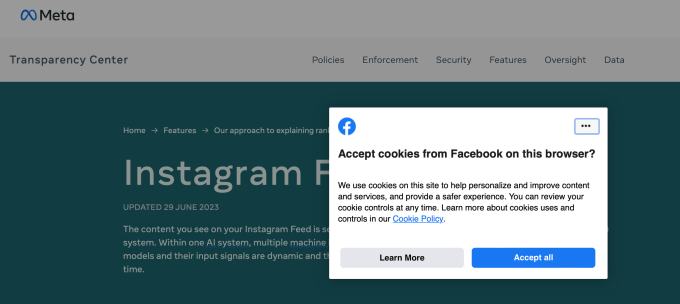Meta has confirmed that non-personalized content feeds are incoming on Facebook and Instagram in the European Union ahead of the August 25 deadline for compliance with the bloc’s rebooted digital rulebook, the Digital Services Act (DSA).
Meta’s move follows a similar announcement by TikTok earlier this month.
The DSA requires larger platforms and search engines (so-called VLOPs and VLOSE) to provide users in the region with the ability to switch off AI-driven “personalization” — a feature which selects and displays content based on tracking and profiling individual users.
Under the DSA, users of larger platforms — 19 of which the EU designated back in April — must be offered a choice of a non-algorithmic feed, where content sorting is not based on tracking.
Instead content could be ordered and displayed chronological (such as based on the time a post was made) or ranked by local popularity (such as for ordering search results). The bloc’s concern is that AI-driven feeds undermine user autonomy and choice, as well as setting up conditions where users could be subject to filter bubbles and at risk of addiction or even facing automated manipulation.
Writing in a blog post summarizing a number of changes it’s making in the name of DSA compliance, Meta’s president of global affairs, Nick Clegg, avoided discussion of the downsides of its AI recommender systems — couching the non-personalized feed as another option for users to “view and discover” content:
We’re now giving our European community the option to view and discover content on Reels, Stories, Search and other parts of Facebook and Instagram that is not ranked by Meta using these [AI recommender] systems. For example, on Facebook and Instagram, users will have the option to view Stories and Reels only from people they follow, ranked in chronological order, newest to oldest. They will also be able to view Search results based only on the words they enter, rather than personalised specifically to them based on their previous activity and personal interests.
It’s not clear when exactly Meta will launch the AI off switch but the deadline for VLOPs’ compliance with the DSA is Friday so presumably it will be made available very shortly. (Penalties for non-compliance with the pan-EU regulation can scale up to 6% of global annual turnover.)
The sight of social media giants like Meta and TikTok whose ad-funded business models depend on keeping eyeballs stuck to their platforms giving users options that are likely to be — in typical tech terminology — less sticky is a milestone indeed. And it’s one being achieved by the pioneering pan-EU regulation.
Clegg’s blog post says non-algorithmic feeds will be available to its “European community”. So users in the U.S. wanting more control over what they see on Facebook and Instagram are clearly out of luck.
We’ve also asked Meta for confirmation that the U.K., which is no longer an EU member after the Brexit referendum vote, will be excluded from the option to deny content personalization.
U.K. users of Facebook are already facing no choice to deny its ad tracking — whereas Meta recently indicated it will switch to ask users in the EU for consent to ad tracking following enforcement of the bloc’s data protection laws and a number of major penalties for breaches of the General Data Protection Regulation. So Meta users in the U.K. are set to see a growing privacy rights gap vs their counterparts elsewhere in Europe.
How long Meta will be able to sustain a situation where it is visibly offering less autonomy to users in major markets like the U.S. and U.K. versus the EU remains to be seen.
The adtech giant is also clearly hoping to persuade EU users not to flick the AI off switch by doubling down on transparency measures and providing what it claims is an “unprecedented level of insight into how our AI systems rank content”.
This is actually another compliance step since the DSA requires VLOPs and VLOSE to provide clear information about AI recommender systems, including detailing the main parameters and any options users have to modify or influence them. Although, from Meta’s point of view, if it can persuade EU users to merely “customize” the algorithmic recommendations they get, rather than switching its “personalization” (i.e. surveillance) off altogether, it might be able to maintain or even increase content stickiness. Hence Clegg’s effusive talk of “unprecedented insights” via it releasing 22 “system cards” for Facebook and Instagram. But of course drowning users in convoluted settings vs giving them a clear choice up-front has been a Facebook modus operandi since forever.
Another DSA-driven change his blog post mentions relates to an enhanced level of ads transparency. While Meta was early dabbler in ads transparency, thanks to (er) the Cambridge Analytica data misuse voter targeting scandal, it is being made to go further now as the EU law kicks in. Again, though, the increased level of transparency Meta is offering around ad targeting will only apply to ads targeting people in the EU.
Per Meta, it will be expanding its existing Ad Library to “display and archive all ads that target people in the EU, along with dates the ad ran, the parameters used for targeting (e.g., age, gender, location) [and] who was served the ad”, among other data points. It also specifies that the ads will be stored in its public Ad Library for a year.
Also incoming as DSA compliance deadline day approaches: More tools for researchers to study content on Meta’s platforms — which is another regulated area under the DSA.
“We’re also rolling out two new tools for researchers – the Meta Content Library and API,” Clegg notes. “The library includes publicly available content from Pages, Posts, Groups and Events on Facebook, as well as publicly available content from creator and business accounts on Instagram. Researchers will be able to search, explore, and filter the publicly available content on a graphical User Interface (UI) or through a programmatic API. These tools will provide the most comprehensive access to publicly-available content across Facebook and Instagram of any research tool we have built to date.”
As the blog post points out, the company has not voluntarily offered this level of access to external researchers before now. Indeed, third party researchers have frequently complained tech giants are intentionally impeding their efforts to study platforms and their societal impacts. So the obvious takeaway is that actual transparency on platforms requires dedicated platform regulation.
Other DSA compliance work Clegg’s blog post mentions the company’s compliance team has undertaken includes some changes to reporting tools for illegal content — which is a core focus for the DSA.
He also reveals the tech giant has over 1,000 people working on compliance with the pan-EU law. “We’ve been working hard since the DSA came into force last November to respond to these new rules and adapt the existing safety and integrity systems and processes we have in place in many of the areas regulated by the DSA,” he writes. “We assembled one of the largest cross-functional teams in our history… to develop solutions to the DSA’s requirements. These include measures to increase transparency about how our systems work, and to give people more options to tailor their experiences on Facebook and Instagram. We have also established a new, independent compliance function to help us meet our regulatory obligations on an ongoing basis.”
The DSA does also put some limits on VLOPs ability to deploy ads that are targeted based on profiling individuals by tracking and processing their personal data — including a total ban on use of minors’ data for ad targeting. There is also a ban on use of sensitive personal data for ad targeting.
On ad targeting Clegg’s blog post has relatively little to say. He merely opts to flag a change Meta made back in February — when it announced it had stopped targeting teens aged 13-17 with ads based on tracking their activity on its apps. “Age and location is now the only information about teens that advertisers can use to show them ads,” he also writes now.
However age and location can still be personal data under EU law. So it remains to be seen whether the EU will deem Meta’s interpretation of the DSA’s prohibition there to be compliant or not.
Meta has also previously claimed to have stopped allowing advertisers to use sensitive personal data like political views, religion and sexual orientation for ad targeting. However recurring issues with ad targeting via the use of proxies for sensitive categories of data — such as when Facebook was found to have allowed advertisers to use “ethnic affinity” targeting to exclude users from seeing ads in protected categories such as housing and employment — suggest regulators should not take its claim to have stopped such sensitive targeting at face value either.
Even a cookie pop-up that displays on Meta’s Transparency Center when you visit the web page (see screengrab below) appears to raise compliance questions since it does not offer users a clear choice to refuse tracking for content personalization and other (non essential) uses — suggesting Meta’s 1,000-strong+ compliance team has more work to do.

The scale of the task Meta is facing to comply with the EU’s expanded digital rulebook — which also includes the DSA’s sister regulation, the Digital Markets Act; an ex ante competition reform targeted at the most powerful platform giants (that Meta expects will include it) — explains the ongoing lack of a Threads launch in the region.
Coming soon to TikTok in Europe: A ‘For You’ feed without the TikTok algorithm






























Comment